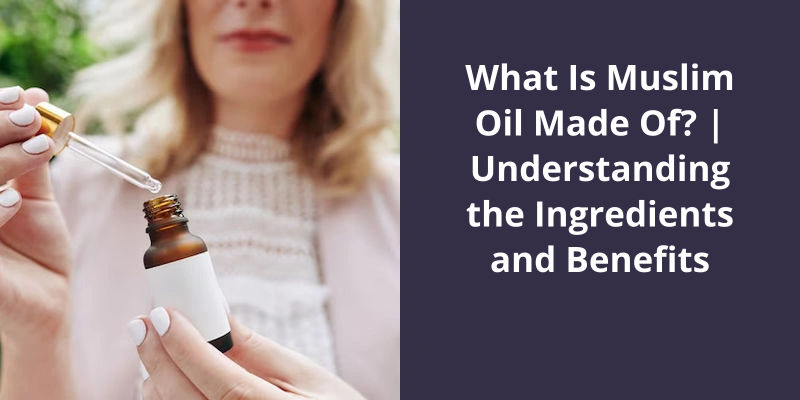Muslim oil, also known as Attar oil, is a type of perfume oil commonly used in Middle Eastern and South Asian cultures. It’s typically made from a variety of natural ingredients including flowers, plants, woods, and spices, which are distilled into a base oil such as sandalwood or jojoba oil. The specific composition of these oils can vary widely, as they’re often crafted to create unique and personal scents. Many people enjoy Muslim oil not only for its fragrance but for the spiritual and therapeutic benefits often associated with the natural ingredients used in its production.

What Kind of Oil Do Muslims Use?
It’s believed to have spiritual and healing properties that aid in meditation and prayer. In fact, it’s mentioned in the hadith, which are the sayings of the Prophet Muhammad.
Outside of religious contexts, Muslims may use various types of oils for daily use, including olive oil, argan oil, and black seed oil. Olive oil has been used in the Middle East for centuries and is often used for cooking, as well as for it’s health benefits. Argan oil, which is derived from the kernels of the argan tree, is commonly used as a cosmetic oil for skin and hair. Black seed oil, also known as black cumin seed oil, has been used in traditional Islamic medicine for it’s various health benefits.
Some Muslims also use essential oils for holistic purposes, such as relaxation or to alleviate stress and anxiety. These essential oils can be diffused, applied topically, or ingested, depending on the oil and it’s intended use. Some common essential oils used by Muslims include lavender, peppermint, and frankincense.
Overall, the use of oils in the Islamic tradition varies depending on the context and purpose. While agarwood is commonly used in religious ceremonies and rituals, other oils such as olive oil and argan oil are used for more practical purposes.
The Benefits of Using These Oils for Spiritual, Physical, and Mental Health
Using certain essential oils can provide benefits for our overall wellness, including spiritual, physical, and mental health. These oils are derived from natural sources and contain fragrant compounds that can soothe and calm our minds, boost our immune system, and balance our energy levels. Incorporating essential oils in our daily routines through aromatherapy or topical application can be a powerful tool in improving our well-being.
Now, let’s focus on the Islamic significance of olive oil and explore it’s use as holy oil in Islamic practices.
What Is the Holy Oil in Islam?
In Islam, the holy oil is commonly referred to as attar or ittar. This oil is extracted from a variety of plant and flower sources such as roses, jasmine, and sandalwood, through a traditional process of steam distillation. The use of attar or ittar is believed to have been introduced to the Islamic world by the Persians in the early years of Islam. And it’s since become an integral part of Muslim culture and tradition, used for various purposes including religious ceremonies, perfume, and aromatherapy.
One of the most significant uses of attar in Islam is in the anointing of the dead body during ritual washing or ghusl. This important Islamic practice is a purification process and a final farewell to the deceased. The use of attar in ghusl is believed to have a symbolic value, representing the purification of the soul as it transitions from this world to the afterlife. Different types of attar or ittar can be used depending on the occasion and the preference of the family of the deceased.
Attar is also used in Islam as a fragrance during prayer and other religious activities. This is believed to enhance the spiritual experience and create a more serene and peaceful environment. It’s customary for Muslims to apply a small amount of attar to their clothes, wrists, and beard before entering a mosque for prayer. This practice is encouraged in Hadith, the sayings of Prophet Muhammad, which promote the use of fragrances in general and Attar, in particular, to spread a good scent and elevate the mood of those around you.
Aside from it’s religious and spiritual significance, attar is also used in Islam as a natural remedy for various ailments. It’s believed to have medicinal properties that can help to improve physical and mental health. For example, jasmine oil is used to ease depression and boost confidence, while rose oil is used to alleviate stress and anxiety. Sandalwood oil is also believed to have a calming effect on the mind and can be used to aid meditation.
It plays an important role in Islamic tradition and practice, from the anointing of the dead to the fragrance used during prayer and other religious ceremonies. Through it’s use, Muslims remain connected to their spiritual roots and express their devotion to Allah and the Islamic faith.
The use of oil as a symbol of spirituality and divine presence isn’t unique to Islam or Judaism. Many religious and spiritual traditions incorporate oil in their practices, whether it be for anointing, blessing, or healing. However, the significance and symbolism attributed to the type of oil used can vary greatly between traditions. In Islam, the anointing oil holds a special place of reverence and importance, as the Prophet Muhammad himself used it in his daily life.
What Is the Anointing Oil in Islam?
It’s believed that olive oil was first cultivated in the Middle East, making it a central ingredient in religious practices throughout the region. In Islam, the anointing oil is typically made by crushing and pressing olives into a fine oil that’s then used to anoint the body. This oil is considered to be pure and holy, and many Muslims believe that it can help to cleanse the body and promote a closer connection with Allah.
The Prophet Muhammad is believed to have used anointing oil regularly as a means of purifying himself. He’d apply it to his body after physical activities, such as exercise or manual labor, to clean himself both spiritually and physically. Additionally, he reportedly used anointing oil in his daily prayers, as a way of showing reverence to Allah and demonstrating his piety.
The use of anointing oil in Islam is steeped in religious tradition, with many Muslims believing that the oil itself is imbued with spiritual power. According to some Islamic texts, the oil can help to promote healing and ward off evil spirits. Additionally, it’s believed that anointing oil can be a powerful aid in achieving personal goals and manifesting positive outcomes in ones life.
For example, it’s often used during Ramadan, a month-long period of fasting and prayer, to help cleanse the body and promote spiritual renewal. Additionally, anointing oil may be used during Hajj, the annual pilgrimage to Mecca that’s required of all able-bodied Muslims at least once in their lifetime.
It’s used to cleanse the body, promote spiritual renewal, and demonstrate reverence to Allah. While the specific methods of preparing and applying the oil may vary from one tradition to another, it’s use is an important part of many Islamic rituals and ceremonies.
The Quran is considered the holy book of Islam and is the primary source of guidance for Muslims. It contains wisdom and teachings that have been passed down through generations, including the benefits of olive oil. According to the Prophet Muhammad (PBUH), olive oil is a sacred tree that can be used to treat numerous ailments and promote overall health and wellness. In this article, we’ll explore what the Quran says about olive oil and how it can be used in everyday life.
What Does Quran Say About Olive Oil?
The Quran is the holy book of Islam, and it’s teachings have had a profound impact on the lives of Muslims all over the world. One of the topics that the Quran touches on is the importance of olive oil. In fact, the Quran mentions the olive tree several times, as it’s seen as a symbol of goodness and abundance.
Prophet Muhammad (PBUH) was a strong believer in the healing power of olive oil. He encouraged his followers to consume it regularly, both as a food and as a medicine. According to his teachings, olive oil is one of the most effective natural remedies for a wide range of health problems, including heart disease, diabetes, arthritis, and more.
In addition to it’s health benefits, olive oil is also considered to be a sacred substance in Islam. The Quran describes the olive tree as a blessed tree that’s nurtured in fertile land, and it’s oil is praised for it’s purity and nourishing qualities.
There are many ways to incorporate olive oil into your diet and daily routine. You can use it for cooking, salad dressings, and marinades, or simply drizzle it over your favorite dishes for added flavor and nutrition. You can also use olive oil as a moisturizer for your skin and hair, as it’s packed with antioxidants and essential fatty acids that nourish and protect your skin cells from damage.
Conclusion
The unique and complex aroma profile of this oil has made it an indispensable ingredient in many perfumes, incense, and other luxury products. While the process of extracting agarwood oil can be time-consuming and labor-intensive, the high demand for this precious oil has made it a lucrative industry for many communities in Southeast Asia and beyond. Whether it’s used for it’s spiritual, medicinal, or cosmetic properties, the rich history and cultural significance of agarwood and it’s oil make it a fascinating and valuable resource.





